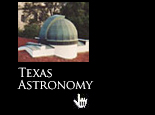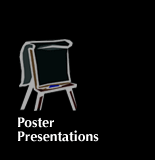Sunday, October 16th
|
7:00pm:
|
Reception (Appetizers and Drinks)
Mansion at Judges Hill
(website)
Map & Parking
(pdf)
1900 Rio Grande Blvd., (512) 495-1800
|
Monday, October 17th
|
8:45:
|
Welcoming Statements
Mary Ann Rankin, Dean, College of Natural Sciences
Don Winget, Chair, Department of Astronomy
|
|
Session I, ACES 2.302 - Judit Györgyey Ries, Chair,
bio
|
9:00-9:40:
|
Asteroids, Kuiper Belt Objects, Comets, Satellites and the Formation of Our Solar System
Scott Sheppard, Carnegie DTM
abstract
bio
|
9:40-10:20:
|
What do Multiple Planet Systems Teach Us About Planet Formation?
Eric Ford, Berkeley
abstract
bio
|
10:20-11:00:
|
Coffee & Posters, ACES 2.402
|
11:00-11:40:
|
Massive Star Formation: A Tale of Two Theories
Mark Krumholz, Princeton
abstract
bio
Stars with masses above about 20 solar masses have short
Kelvin-Helmholtz times that enable them to reach the main sequence
while still accreting from their natal clouds. The resulting nuclear
burning produces a huge luminosity and a correspondingly large
radiation pressure force on dust grains suspended in the incoming
gas. Early work suggested that this effect imposed an upper limit of
about 20 solar masses on stars forming from gas with the normal
galactic dust abundance, and even more recent two-dimensional
simulations and analytic calculations have not yet been able to
explain the existence of stars of 50 solar masses and larger. In this
review I will present the current state of this long-standing
problem, and discuss the two primary approaches to solving it. One
holds that the most massive stars form by direct collisions between
lower mass stars and their disks. The other approach is to see if the
radiation barrier can be overcome by a more accurate and realistic
treatment of the radiation-hydrodynamic accretion process. I will
discuss the theoretical background to each model, the observational
predictions that can be used to test them, and the substantial parts
of the problem that neither theory has fully addressed.
|
|
11:40-12:20:
|
Probing Chemistry During Star and Planet Formation
Jackie Kessler-Silacci, UT
abstract
bio
|
12:20-2:00:
|
Lunch* & Posters
*includes a 1 hour Q&A session
with
postdoc speakers and graduate students
|
|
Session II, ACES 2.302 - Michael Siegel, Chair,
bio
|
2:00-2:40:
|
Disks Around Young Stars
Christine Chen, NOAO
abstract
bio
|
2:40-3:20:
|
Local Interstellar Medium
Seth Redfield, UT
abstract
bio
|
3:20-4:00:
|
Coffee & Posters, ACES 2.402
|
4:00-4:40:
|
Large-scale Structures in the ISM
Naomi McClure-Griffiths, ATNF
abstract
bio
|
4:40-5:40:
|
Panel Discussion
|
5:40-6:30:
|
Posters, Informal Discussion
|
7:30pm:
|
Conference Dinner at Fonda San Miguel
Map & Parking
(pdf)
2330 W. North Loop, (512) 459-4121
|
Tuesday, October 18th
|
|
Session III, ACES 2.302 - Martin Landriau, Chair,
bio
|
9:00-9:40:
|
Stellar Abundances: Recent and Foreseeable Trends
Carlos Allende-Prieto, UT
abstract
bio
|
9:40-10:20:
|
Black Holes
Jon Miller, Univ. Michigan
abstract
bio
|
10:20-11:00:
|
Coffee & Posters, ACES 2.402
|
11:00-11:40:
|
Jets and Accretion in Microquasars and in AGN
Sera Markoff, MIT
abstract
bio
|
11:40-12:20:
|
Galactic Chemical Evolution
Yeshe Fenner, CfA
abstract
bio
|
12:20-2:00:
|
Lunch* & Posters
*includes a 1 hour Q&A session
with
postdoc speakers and graduate students
|
|
Session IV - Niv Drory, Chair,
bio
|
2:00-2:40:
|
The N-body Approach to Disk Galaxy Evolution
Victor Debattista, Univ. Washington
abstract
bio
|
2:40-3:20:
|
Galaxy Formation
Eric Gawiser, Yale
abstract
bio
|
3:20-4:00:
|
Coffee & Posters, ACES 2.402
|
4:00-4:40:
|
Lyman-alpha Forest as a Cosmological Probe
Matteo Viel, IoA
abstract
bio
|
4:40-5:40:
|
Panel Discussion
|
5:40-6:00:
|
Concluding Remarks
David Lambert, Director, McDonald Observatory
Frank Bash, Professor, Department of Astronomy
|
6:00-6:30:
|
Posters, Informal Discussion
|
Evening:
|
Informal "Night on the Town"
|


